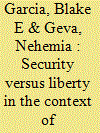|
|
|
Sort Order |
|
|
|
Items / Page
|
|
|
|
|
|
|
| Srl | Item |
| 1 |
ID:
103892


|
|
|
|
|
| Publication |
2011.
|
| Summary/Abstract |
What effect does repeated play have on reputation building? The literature on international relations remains divided on whether, when, and how reputation matters in both interstate and intrastate conflict. We examine reputation building through a series of incentivized laboratory experiments. Using comparative statics from a repeated entry-deterrence game, we isolate how incentives for reputation building should change as the number of entrants changes. We find that subjects in our experiments generally build reputations and that those investments pay off, but we also find that some subjects did not react to incentives to build reputation in ways our model had predicted. In order to explain this, we focus on the heterogeneity of preferences and cognitive abilities that may exist in any population. Our research suggests that rational-choice scholars of international relations and those using more psychologically based explanations have more common ground than previously articulated.
|
|
|
|
|
|
|
|
|
|
|
|
|
|
|
|
| 2 |
ID:
159574


|
|
|
|
|
| Summary/Abstract |
In the conflict bargaining literature, three variables have a primary explanatory role: relative power, status quo conditions, and leadership preferences. While leadership preferences loom large in case study research, they are either absent or poorly proxied in large-N statistical studies. Using a series of three experiments, we test for the effects of relative power, status quo conditions, and leadership preferences on decisions to apply various levels of nonviolent and violent pressure in ethno-territorial disputes. The experimental designs presented in this study offer the opportunity to isolate the impact of leadership preferences on political strategy choices in ethno-territorial disputes. The results demonstrate that, at least in an experimental setting, leadership preferences are, in fact, significant predictors of political strategy choices, even after controlling for relative power and status quo conditions.
|
|
|
|
|
|
|
|
|
|
|
|
|
|
|
|
| 3 |
ID:
175583


|
|
|
|
|
| Summary/Abstract |
Why would individuals engage in or support contentious politics? This question is challenging to answer with observational data where causal factors are correlated and difficult to measure. Using a survey-embedded experiment, we focus on three situational factors: grievances, risk, and identity. We also explore how individual differences in sociopolitical orientations—social dominance orientation (SDO) and right-wing authoritarianism (RWA)—impact action. Grievances influence engagement in and support for protests. Risk influences engagement in protest, but not support for it. Regardless of condition, SDO and RWA help explain why some people engage in protest while others do not, particularly within the same context.
|
|
|
|
|
|
|
|
|
|
|
|
|
|
|
|
| 4 |
ID:
144927


|
|
|
|
|
| Summary/Abstract |
A critical question in counterterrorism studies concerns the extent to which governments adequately balance the continual provision of individual rights and freedoms with the appropriate level of national security when faced with a terrorist attack. We experimentally assess this tradeoff utilizing a 2 × 2 × 2 between-groups factorial design, manipulating (a) the extent of terror-related threats, (b) the level of invasiveness of subsequent counterterrorism policies, as well as (c) the terror context: transnational and domestic. The results provide evidence that the public is more willing to accept greater reductions in civil liberties under a greater threat of terrorism only when the perceived effectiveness of those policies to prevent future acts of terrorism is high. Furthermore, we find these results to be specific to the context of a transnational terror threat. This suggests that the public will be unwilling to accept reductions in civil liberties when the source of the attack is domestic, regardless of the level of threat or how effective subsequent policies may be in preventing future attacks.
|
|
|
|
|
|
|
|
|
|
|
|
|
|
|
|
|
|
|
|
|